八年级英语(1)
初中英语人教版八年级上册重点知识整理(1~3单元)

八年级英语上册重点知识整理Unit1 Where did you go on vacation?【重点语法】不定代词:不指名代替任何特定名词或形容词的代词叫做不定代词。
用法注意:1、some 和any+可数名/不可数名。
some 多用于肯定句,any多用于否定句、疑问句和条件从句。
有些问句中用some,不用any, 问话者希望得到对方肯定回答。
2、由some, any, no,every 与 body, one, thing构成的复合不定代词作主语时,其谓语动词用三单。
3、不定代词若有定语修饰,该定语要置于其后:如:something interesting【重点短语】1.buy sth for ab./ buy sb.sth 为某人买某物2.taste + adj.尝起来……3.nothing...but + V.(原形) 除了……之外什么都没有4.seem + (to be) + adj 看起来5.arrive in + 大地方 / arrive at + 小地方到达某地6.decide to do sth.决定做某事7.try doing sth.尝试做某事 / try to do sth.尽力做某事8.enjoy doing sth.喜欢做某事9.want to do sth.想去做某事10.start doing sth.开始做某事/ begin doing sth.11.stop doing sth.停止做某事区分:stop to do sth.停下来去做某事12.dislike doing sth.不喜欢做某事14.so + adj + that + 从句如此……以至于……16.tell sb.(not) to do sth.告诉某人(不要)做某事17.keep doing sth. 继续做某事18.forget to do sth.忘记去做某事 / forget doing sth 忘记做过某事【词语辨析】1.take a photo/ take photos 拍照2.seem + 形容词看起来…seem + to do sth.似乎/好像做某事It seems + 从句似乎..….It seems that no>seem like ...好像,似乎…3.arrive in +大地点= get to= reach+地点名“到达......”arrive at +小地点(注:若后跟地点副词here/there/home, 介词需省略,如:arrive here; get home)4.feel like sth 感觉像…feel doing sth.想要做某事5.wonder(想知道)+疑问词(who, what, why)引导的从句。
八年级上册英语第一单元unit1知识点及练习题
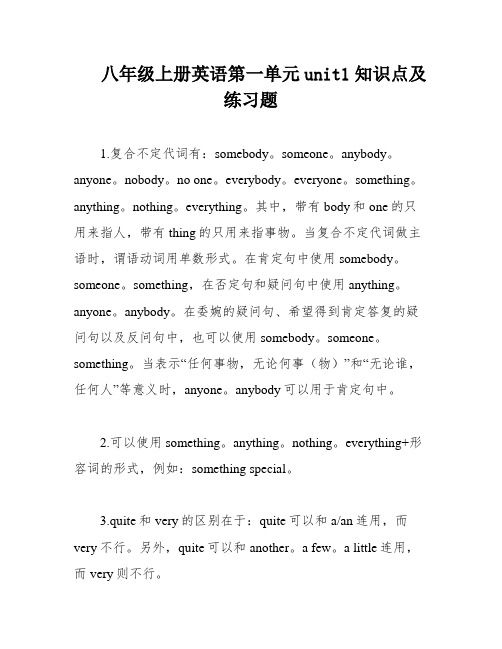
八年级上册英语第一单元unit1知识点及练习题1.复合不定代词有:somebody。
someone。
anybody。
anyone。
nobody。
no one。
everybody。
everyone。
something。
anything。
nothing。
everything。
其中,带有body和one的只用来指人,带有thing的只用来指事物。
当复合不定代词做主语时,谓语动词用单数形式。
在肯定句中使用somebody。
someone。
something,在否定句和疑问句中使用anything。
anyone。
anybody。
在委婉的疑问句、希望得到肯定答复的疑问句以及反问句中,也可以使用somebody。
someone。
something。
当表示“任何事物,无论何事(物)”和“无论谁,任何人”等意义时,anyone。
anybody可以用于肯定句中。
2.可以使用something。
anything。
nothing。
everything+形容词的形式,例如:something special。
3.quite和very的区别在于:quite可以和a/an连用,而very不行。
另外,quite可以和another。
a few。
a little连用,而very则不行。
4.few表示否定意义的可数名词复数,a few表示肯定意义的可数名词复数,little表示否定意义的不可数名词,XXX表示肯定意义的不可数名词。
5.what about和how about都可以表示询问“做…怎么样”,后面接动词ing形式。
6.seem和look的区别在于:seem暗示有一定根据的判断,look指由视觉而得出的印象。
7.XXX形容人感到无聊,XXX形容物使人感到无聊。
8.arrive at用于小地方,arrive in用于大地方。
9.decide to do sth和make up one's mind to do sth都表示“决定做某事”。
八年级上册英语unit1知识点最新整理
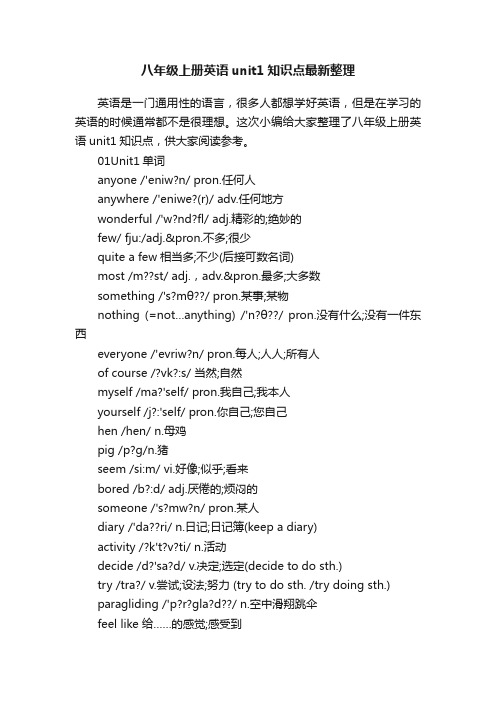
八年级上册英语unit1知识点最新整理英语是一门通用性的语言,很多人都想学好英语,但是在学习的英语的时候通常都不是很理想。
这次小编给大家整理了八年级上册英语unit1知识点,供大家阅读参考。
01Unit1单词anyone /'eniw?n/ pron.任何人anywhere /'eniwe?(r)/ adv.任何地方wonderful /'w?nd?fl/ adj.精彩的;绝妙的few/ fju:/adj.&pron.不多;很少quite a few相当多;不少(后接可数名词)most /m??st/ adj.,adv.&pron.最多;大多数something /'s?mθ??/ pron.某事;某物nothing (=not…anything) /'n?θ??/ pron.没有什么;没有一件东西everyone /'evriw?n/ pron.每人;人人;所有人of course /?vk?:s/ 当然;自然myself /ma?'self/ pron.我自己;我本人yourself /j?:'self/ pron.你自己;您自己hen /hen/ n.母鸡pig /p?g/n.猪seem /si:m/ vi.好像;似乎;看来bored /b?:d/ adj.厌倦的;烦闷的someone /'s?mw?n/ pron.某人diary /'da??ri/ n.日记;日记簿(keep a diary)activity /?k't?v?ti/ n.活动decide /d?'sa?d/ v.决定;选定(decide to do sth.)try /tra?/ v.尝试;设法;努力 (try to do sth. /try doing sth.)paragliding /'p?r?ɡla?d??/ n.空中滑翔跳伞feel like 给……的感觉;感受到bird /b?:d/ n.鸟bicycle /'ba?s?kl/ n.自行车;脚踏车building /'b?ld??/ n.建筑物;房子trader /'tre?d?(r)/ n.商人wonder /'w?nd?(r)/ v.想知道;琢磨difference /'d?fr?ns/ n.差别;差异top /t?p/ n.顶部;表面wait /we?t/ v.等待;等候(wait for)umbrella /?m'brel?/ n.伞;雨伞wet /wet/ adj.湿的;雨天的because of因为below /b?'l??/ prep.&adv.在……下面;到……下面enough /?'n?f/ adj.足够的(地)adv.充足的(地);充分的(地)hungry /'h??ɡri/ adj.饥饿的as /?z/ conj.像……一样;如同hill /h?l/ n.小山;山丘duck /d?k/ n.鸭dislike /d?s'la?k/v.&n.不喜爱(的事物);厌恶(的事物)Central Park 中央公园(美国纽约)HuangguoshuWarterfall /'w?:t?(r)f?:l/ 黄果树瀑布(贵州)HongKong /,h??'k??/,/'ha:?,ka:?/香港(中华人民共和国特别行政区)Malaysia /m?'le/马来西亚;Malaysian /m?'le??n/adj.马来西亚的;n.马来西亚人;Georgetown /?d??:d?ta?n/乔治市(马来西亚)Weld /weld/ Quay /ki:/ 海墘街Penang /p??n??/ Hill 槟城山(马来西亚)Tian'anmen Square /skwe?/,/skwer/天安门广场the Palace /?p?l?s/ Museum 故宫博物院Mark /mɑ:(r)k/马克(男名)02Unit1知识梳理Unit1. Where did you go on vacation?【重点短语】1. go on vacation 去度假2. stay at home 呆在家3. go to the mountains 上山/进山4. go to the beach 到海边去5. visit museums 参观博物馆6. go to the summer camp 去夏令营7. quite a few 相当多8. study for为…… 学习,9. go out 出去10. most of the time 大部分时间/绝大多数时间11. taste good 尝起来味道好12. have a good time 玩的开心13. of course 当然可以14. feel like 感觉像……/想要15. go shopping 去购物16. in the past 在过去17. walk around 绕……走18. too many 太多(可数名词前面)19. because of 因为20. one bowl of 一碗……21. find out 查出来/发现22. go on 继续23. take photos 照相24. something important 重要的事情25. up and down 上上下下26. come up 出来【重点句型】1. —Where did you go on vacation? 你到哪里去度假了?—I went to New York City. 我去了纽约城。
(完整版)人教版八年级上册英语unit1知识点及习题

Unit1 Where did you go on vacation一、书本重要语法点梳理go on vacation去度假 stay at home待在家里go to the mountains去爬山 go to the beach去海滩visit museums 参观博物馆 go to summer camp去参观夏令营quite a few相当多 study for为……而学习go out出去most of the time大部分时间taste good尝起来很好吃 have a good time玩得高兴]of course当然feel like给……的感觉;感受到go shopping去购物in the past在过去walk around四处走走because of因为one bowl of…一碗…… the next day第二天drink tea喝茶find out找出;查明go on继续 take photos照相something important重要的事 up and down上上下下come up出来buy sth. for sb. / buy sb. sth.为某人买某物taste + adj. 尝起来…… look+adj. 看起来……nothing…but+动词原形除了……之外什么都没有seem+(to be)+ adj. 看起来……arrive in+大地点 / arrive at+小地点到达某地decide to do sth.决定去做某事try doing sth.尝试做某事 try to do sth.尽力去做某事forget doing sth.忘记做过某事 forget to do sth.忘记做某事enjoy doing sth.喜欢做某事 want to do sth.想去做某事start doing sth.开始做某事 stop doing sth. 停止做某事dislike doing sth. 不喜欢做某事keep doing sth.继续做某事Why not do. sth.为什么不做……呢so+adj.+that+从句如此……以至于……tell sb. (not) to do sth. 告诉某人(不要)做某事1. on vacation 度假vacation意为“假期、假日”,相当于holiday,但vacation 表示长的假期。
(完整版)新人教版八年级英语上册unit1知识点总结

Unit 1 where did you go on vacation ➢单词复习:任何人Anywhere 精彩的;极好的最多的;大多数的没有什么n.没有。
每人;人人.我自己你自己;你亲自hen pig似乎;好像无聊的;厌烦的;郁闷的Someone Diary 活动;活跃。
决定;选定Paragliding bird bicycle building trader惊奇;想知道;怀疑差异;不同顶部;顶等;等待湿的;雨天的低于;在。
..下面饥饿的;渴望的如同;像.。
一样HillDuck不喜欢;厌恶短语归纳1、go on vacation去度假 ,2、stay at home 呆在家,3、go to the mountains 上山/进山,4、go to the beach到海边去,5、visit museums 参观博物馆,6、go to summer camp 去夏令营,7、quite a few 相当多,8、study for为……学习,9、go out 出去,10、most of the time 大部分时间/绝大多数时间,11、taste good 尝起来味道好,12、have a good time玩的开心,13、of course当然可以,14、feel like(doing sth)感觉像……/想要,15、go shopping购物,16、in the past 在过去,17、walk around绕……走,18、too many 太多(可数名词前面),19、because of 因为,20、one bowl of 一碗……,21、find out 查出来/发现,22、go on继续,23、take photos 照相,24、something important重要的事情,25、up and down上上下下,26、come up出来➢习惯用法、搭配1. buy sth。
for sb.=buy sb. sth。
人教版八年级英语unit1单词详解
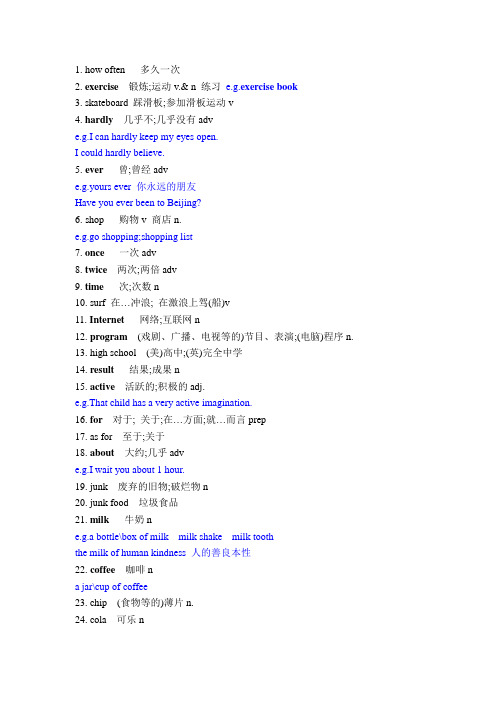
1. how often 多久一次2. exercise 锻炼;运动v.& n 练习e.g.exercise book3. skateboard 踩滑板;参加滑板运动v4. hardly 几乎不;几乎没有adve.g.I can hardly keep my eyes open.I could hardly believe.5.ever 曾;曾经adve.g.yours ever 你永远的朋友Have you ever been to Beijing?6.shop 购物v 商店n.e.g.go shopping;shopping list7. once一次adv8. twice两次;两倍adv9. time次;次数n10. surf 在…冲浪; 在激浪上驾(船)v11. Internet 网络;互联网n12. program(戏剧、广播、电视等的)节目、表演;(电脑)程序n.13. high school (美)高中;(英)完全中学14. result 结果;成果n15. active活跃的;积极的adj.e.g.That child has a very active imagination.16. for 对于; 关于;在…方面;就…而言prep17. as for 至于;关于18. about 大约;几乎adve.g.I wait you about 1 hour.19. junk 废弃的旧物;破烂物n20. junk food 垃圾食品21. milk牛奶ne.g.a bottle\box of milk milk shake milk tooththe milk of human kindness 人的善良本性22.coffee咖啡na jar\cup of coffee23. chip (食物等的)薄片n.24. cola 可乐na glass\can\bottle of cola25.chocolate 巧克力nmilk chocolate26.drink 喝;饮v.Let's go for a drink.In hot weather,you should drink plenty of water.27. health 健康;健康状况n28. how many 多少29. interviewer 采访者n. interviewee 被采访者n. interview 面试,采访n&v30. habit习惯;习性neating\diet habit31.try 试图;设法;努力v.try to do sthtry dong sth32. of course 当然;自然sure; certainly33. look after 照顾;照看take care of34. lifestyle 生活方式n.35. grade分数;成绩n36. better (good和well的比较级)更好的(地);;(健康状况)好转的adj. & adv37. same 同样的;相同的adj.38. as 像…(一样) prepthe same as…39. different 差异的;不同的adj. same40. difference不同;差异;区别n same difference 差不多41. unhealthy 不健康的;不益于健康的adj. an unhealthy lifestyle42. yuck呸;啐(表示反感、厌恶等)interj43. maybe或许;大概adv.44. although (=though)虽然;即使;纵然conj.45. for (表示时间、距离、数量)达;计prep46. grandpa爷爷;外公n.47. a lot of大量;许多48. keep 保持;使保持某种状态v. keep healthyKeep off the grass! 勿踏草坪!49. must 必须v50. less (little的比较级) 较小的;更小的;较少的;更少的adj. less and less 越来越少。
冀教版八年级英语上册Unit1Lesson1《BacktoSchool》课件

You and your desk mate act it out.
Writing Discuss the following questions: ▲ How do you like Grade 8? ▲What is new this term? ▲ Are there any new students ? ▲ Do you have any new subjects? Then write a short passage.
冀教版八年级英语上册 Unit1Lesson1《
BacktoSchool》课件
2024/2/1
▲ How do you like the first day of a new school year?
Everything is new and exciting to me.
I really look forward to the new start.
▲ Read the lesson and answer the questions.
1. How many new classmates does Danny have? What are their names? Two. One is Sandra the other is Mary.
2. What advice does LM give Danny on how to start a conversation with Sandra?
I feel happy to see my classmates again.
I don `t really know how to get ready for the new term.
人教版八年级英语上册unit-1复习课件(共43张PPT)

1.buy anything special买特别的东西。(P2) buy及物动词,意为“买;购买” 其过去式为______。 拓展:buy stbho.ufogrhtsb.=buy sb. sth.意为“给 某人买某物”。
My uncle_____ _____a bike.
去购物
16.in the past
在过去
17. walk around
四处走走
18. because of
因为
19. one bowl of…
一碗……
20. the next day
第二天
21. drink tea
喝茶
22. find out
找出; 查明
23.take photos
照相
25. something important
stay at home
visit grandparents
2、短语读记
1. go on vacation
去度假
2.stay at home
待在家里
3.go to the mountains
去爬山
4. go to the beach
去海滩
5. visit museums
参观博物馆
6. go to summer camp 去参加夏令营
重要的事
26. up and down
上上下下
27. study for tests
为考试而学习…
28. buy sth. for sb. / buy sb. sth. 为某人买某物
29. taste + adj.
八年级英语上册-人教版-Unit 1 教案

八年级英语上册-人教版-Unit 1 教案一. 教材分析本单元的主题是“My school”,主要介绍学校的基本情况和学校生活。
通过本单元的学习,学生能够掌握有关学校的基本词汇,如classroom, teacher, student等,同时能够运用这些词汇进行简单的英语交流。
二. 学情分析八年级的学生已经掌握了基本的英语语法和一定量的词汇,对英语学习有了一定的兴趣和基础。
但部分学生在英语学习中还存在一定的困难,如口语表达能力和听力理解能力。
因此,在教学过程中,需要关注学生的个体差异,因材施教。
三. 教学目标1.知识目标:学生能够掌握有关学校的基本词汇和句型,如“This is myclassroom. This is my teacher.”等。
2.能力目标:学生能够用英语简单介绍自己的学校和生活,提高口语表达能力和听力理解能力。
3.情感目标:培养学生对学校生活的热爱和珍惜,激发学生学习英语的兴趣。
四. 教学重难点1.重点:掌握有关学校的基本词汇和句型。
2.难点:能够用英语进行简单的交流和描述。
五. 教学方法1.任务型教学法:通过完成各种任务,激发学生的学习兴趣,提高学生的参与度。
2.情境教学法:创设各种真实的学校情境,帮助学生理解和运用所学知识。
3.小组合作学习:鼓励学生相互交流、讨论,提高学生的合作能力和团队精神。
六. 教学准备1.教学素材:准备相关的图片、视频、课件等,以便在课堂上进行展示和教学。
2.教学工具:准备黑板、粉笔、多媒体设备等。
3.学生活动准备:学生提前预习教材,了解本节课的基本内容。
七. 教学过程1.导入(5分钟)利用图片或视频展示学校的场景,引导学生谈论学校的基本情况,如“This is my school. This is my classroom.”等,激发学生的学习兴趣。
2.呈现(10分钟)展示本节课的主要词汇和句型,如“This is my teacher. This is my student.”等,并用课件或板书进行解释和展示。
八年级英语上册Unit1

八年级英语上册Unit 1语法(1):复合不定代词或副词的构成及用法构成:由some, any, no, every分别加上-body, -thing, -one.构成的不定代词叫做复合不定代词;即:加上-where构成复合不定副词。
即:用法:(1)复合不定代词在句中可以作主语,谓语动词用单数Everybody (have)a dreamThere (be)nothing wrong with my bikeListen , somebody (sing) in the room(2)something somebody someone some where 通常用于肯定句中;Anything anybody anyone anywhere则多用于否定句、疑问句中。
但something somebody someone some where可用于表请求、邀请、预料对方会作肯定回答时的疑问句中。
常见的有:Nothing nobody nowhere 本身表示否定含义不能和否定词not hardly 等连用everything everybody everyone everywhere 表示全体所有一切的意思根据情况用于肯定句否定句疑问句中(3)形容词修饰不定代词时,通常要放在不定代词之后. 形容词修饰不定代词要后置。
There is something delicious on the table.(4)somewhere, anywhere, nowhere, everywhere用作副词。
Flowers come out everywhere.一用复合不定代词或不定副词填空:1. I can’t hear anything = I can hear ________ _.2. There is _________ on the floor. Please pick it up.3. Did ______ _ go to play basketball with you ?4. I phoned you last night, but ________ answered it.5. Maybe _________ put my pencil _________. I can’t find it ______.6. Could you give me ___________ to eat ?7 there is not __________ in the box it is empty (空的)8 . _________here, no one is away9 . I didn’t find _____ ( someone ) there.10 . Is there ______ _( something ) important in today’s newspaper?三单选1 . No one ________ how to do it.A.knowB. knowsC. knowingD. knew2. Everything_____ OK, isn’t it? A. was B. are C. and D. is3. There’s________in the newspaper. You should read it.A. important somethingB. something boringC. boring somethingD. something important.4.There is _______ in today’s news you don’t need wacth itA. new something B .anything newC . something newD .nothing new13 ---- Did you buy ______ special? ---- No, I didn’t.A. somethingB. some thingsC. anything15 ________ ready now, let’s begin.A.Everything isB.Something are C .Nothing are D.Anything is16.I’m free now, I have _________ to do .A.EverythingB.Something C .Nothing D.Anything语法(2)一般过去时1.一般过去时用法:一般过去时表示过去某时间发生的动作或存在的状态或过去经常性发生的事作,常和过去时间状语连用:yesterday, last night ,two days ago,in 2000, at that time, when 等引导的含过去时的句子。
八年级英语上册unit1教案

八年级英语上册unit1教案有一个很好的英语教案,其英语课程的效果才能会明显。
这是店铺整理的八年级英语上册unit1教案,希望你能从中得到感悟!八年级英语上册unit1教案(一)教学目标:1.语言知识目标:1) 能掌握以下单词:anyone, anywhere, wonderful, quite a few, most, something, nothing, everyone, of course, myself, yourself 能掌握以下句型:①—Where did you go on vacation? —I went to the mountains.②—Where did Tina to on vacation? —She went to the beach.③—Did you go with anyone? —Yes, I did./No, I didn’t.2) 能了解以下语法:—复合不定代词someone, anyone, something, anything等的用法。
—yourself, myself等反身代词的用法。
3) 一般过去时态的特殊疑问句,一般疑问句及其肯定、否定回答。
2.情感态度价值观目标:学会用一般过去时进行信息交流,培养学生的环保意识,热爱大自然。
八年级英语上册unit1教案(二)教学重难点1. 教学重点:1) 用所学的功能语言交流假期去了什么旅行。
2) 掌握本课时出现的新词汇。
2. 教学难点:1) 复合不定代词someone, anyone, something, anything等的用法。
2) yourself, myself等反身代词的用法。
八年级英语上册unit1教案(三)1. Show some pictures on the big screen. Let Ss read the expressions.2. Focus attention on the picture. Ask: What can you see? Say: Each picture showssomething a person did in the past. Name each activity and ask students to repeat:Stayed at home, Went to mountains, went to New York City 6. Went to the beach,visited my uncle, visited museums, went to summer camp3. Now, please match each phrase with one of the pictures next to the name of theactivity,point to the sample answer.4. Check the answers. Answers: 1. f 2. b 3. g 4. e5. c6. a7. dIII. Listening1. Point to the picture on the screen.Say: Look at the picture A. Where did Tina go on vacation? She went to mountains.Ask: What did the person do in each picture?2. Play the recording the first time.3. Play the recording a second time.Say: There are three conversations. The people talk about what did on vacation. Listen to the recording and write numbers of the names in the right boxes of the picture.4. Check the answers.IV.Pair work1. Point out the sample conversation. Ask two Ss to read the conversation to the class.2. Now work with a partner. Make your own conversationabout the people in the picture.3. Ss work in pairs. As they talk, move around the classroom and give any help they need.4. Let some pairs act out their conversations.V. Listening1. Tell Ss they will hear a conversation about three students’conversations. Listen for the first time and fill in the chart. Then listen again and check Yes, or No.2. Let Ss read the phrases in the chart of 2b.3. Play the recording the first time. Ss listen and fill in the chart.4. Play the recording a second time for the Ss to check “Yes,I did.” or “No, I didn’t. ”5. Check the answers with the Ss.VI. Pair work1. Let two Ss read the conversation between Grace, Kevin and Julie.2. Let Ss work in pairs and try to role-play the conversation.3. Ask some pairs to act out their conversations.VII. Role-play1. First let Ss read the conversation and match the people and places they went.2. Let Ss act out the conversations in pairs.3. Some explanations in 2d.。
八年级英语第一单元知识点及练习
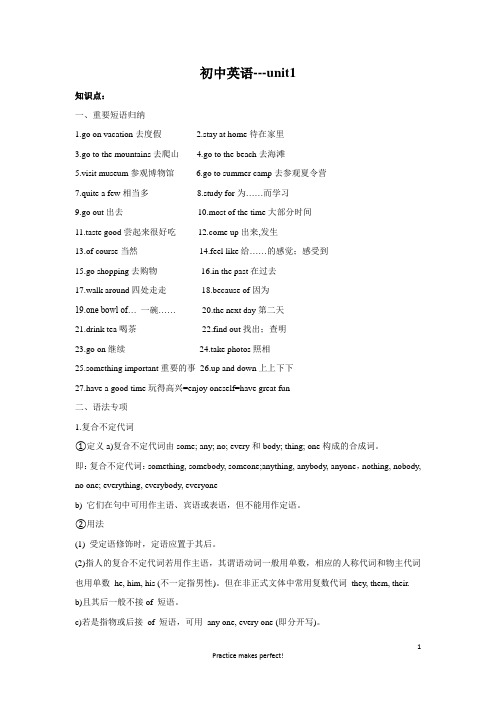
初中英语---unit1知识点:一、重要短语归纳1.go on vacation去度假2.stay at home待在家里3.go to the mountains去爬山4.go to the beach去海滩5.visit museum参观博物馆6.go to summer camp去参观夏令营7.quite a few相当多8.study for为……而学习9.go out出去10.most of the time大部分时间11.taste good尝起来很好吃e up出来,发生13.of course当然14.feel like给……的感觉;感受到15.go shopping去购物16.in the past在过去17.walk around四处走走18.because of因为19.one bowl of… 一碗……20.the next day第二天21.drink tea喝茶22.find out找出;查明23.go on继续24.take photos照相25.something important重要的事26.up and down上上下下27.have a good time玩得高兴=enjoy oneself=have great fun二、语法专项1.复合不定代词①定义a)复合不定代词由some; any; no; every和body; thing; one构成的合成词。
即:复合不定代词:something, somebody, someone;anything, anybody, anyone,nothing, nobody, no one; everything, everybody, everyoneb) 它们在句中可用作主语、宾语或表语,但不能用作定语。
②用法(1) 受定语修饰时,定语应置于其后。
(2)指人的复合不定代词若用作主语,其谓语动词一般用单数,相应的人称代词和物主代词也用单数he, him, his (不一定指男性)。
八年级英语第一单元
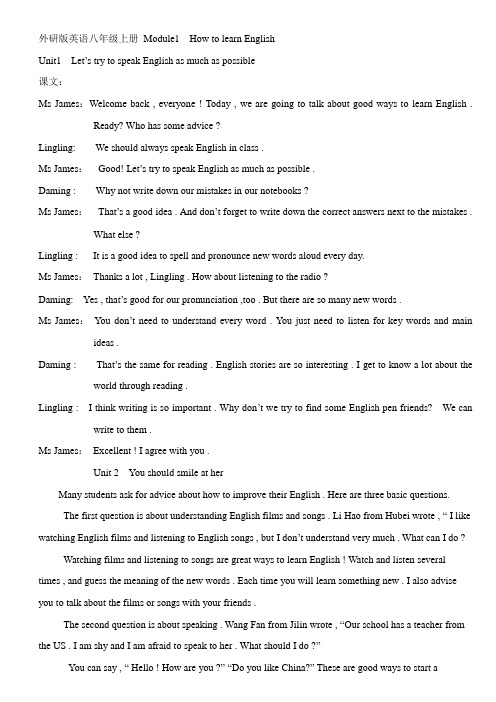
外研版英语八年级上册Module1 How to learn EnglishUnit1 Let’s try to speak English as much as possible课文:Ms James:Welcome back , everyone ! Today , we are going to talk about good ways to learn English .Ready? Who has some advice ?Lingling:We should always speak English in class .Ms James:Good! Let’s try to speak English as much as possible .Daming : Why not write down our mistakes in our notebooks ?Ms James:That’s a good idea . And don’t forget to write down the correct answers next to the mistakes .What else ?Lingling :It is a good idea to spell and pronounce new words aloud every day.Ms James:Thanks a lot , Lingling . How about listening to the radio ?Daming: Yes , that’s good for our pronunciation ,too . But there are so many new words .Ms James:You don’t need to understand every word . You just need to listen for key words and main ideas .Daming :That’s the same for reading . English stories are so interesting . I get to know a lot about the world through reading .Lingling : I think writing is so important . Why don’t we try to find some English pen friends?We can write to them .Ms James:Excellent ! I agree with you .Unit 2 You should smile at herMany students ask for advice about how to improve their English . Here are three basic questions.The first question is about understanding English films and songs . Li Hao from Hubei wrote , “ I like watching English films and listening to English songs , but I don’t understand very much . What can I do ?Watching films and listening to songs are great ways to learn English ! Watch and listen several times , and guess the meaning of the new words . Each time you will learn something new . I also advise you to talk about the films or songs with your friends .The second question is about speaking . Wang Fan from Jilin wrote , “Our school has a teacher from the US . I am shy and I am afraid to speak to her . What should I do ?”You can say , “ Hello ! How are you ?”“Do you like China?” These are good ways to start aconversation . And before you begin , you should smile at her ! Remember this : Do not be shy . Just try .The third question is about vocabulary . Zhang Lei from Anhui wrote , “ I write down new words , but I forget them quickly . How can remember them?”Do not worry . It is natural to forget new words ! I suggest you write four or five words a day on pieces of paper and place them in your room . Read the words when you see them , and try to use them .。
八上英语一单元知识点
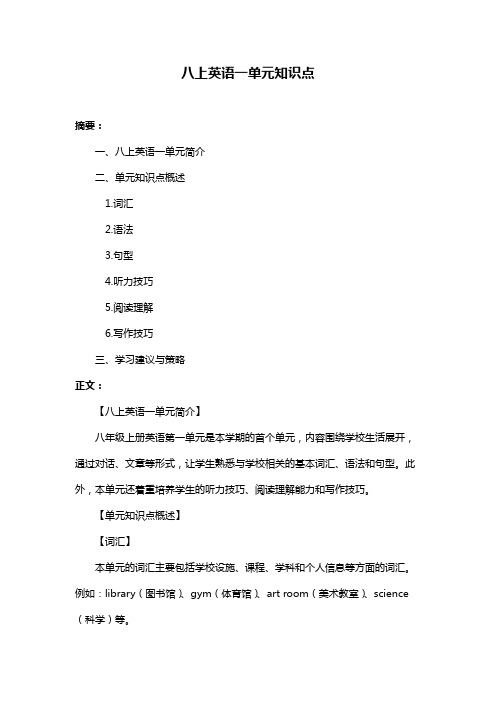
八上英语一单元知识点摘要:一、八上英语一单元简介二、单元知识点概述1.词汇2.语法3.句型4.听力技巧5.阅读理解6.写作技巧三、学习建议与策略正文:【八上英语一单元简介】八年级上册英语第一单元是本学期的首个单元,内容围绕学校生活展开,通过对话、文章等形式,让学生熟悉与学校相关的基本词汇、语法和句型。
此外,本单元还着重培养学生的听力技巧、阅读理解能力和写作技巧。
【单元知识点概述】【词汇】本单元的词汇主要包括学校设施、课程、学科和个人信息等方面的词汇。
例如:library(图书馆)、gym(体育馆)、art room(美术教室)、science (科学)等。
【语法】本单元的语法主要涉及一般现在时和现在进行时的用法。
通过学习,学生将了解到一般现在时用于描述经常发生的动作或状态,而现在进行时则表示正在进行的动作。
【句型】本单元句型主要包括日常交流中的问候、介绍、询问和表达看法等。
如:What"s your name?(你叫什么名字?)、What grade are you in?(你在几年级?)等。
【听力技巧】通过本单元的学习,学生将能听懂与学校生活相关的简单对话和问题,并能够根据所听内容进行信息筛选和判断。
【阅读理解】本单元的学习材料包括对话和文章,学生将学会通过阅读理解文章内容,回答问题和解决问题。
此外,还将培养学生的速读和略读技巧,提高阅读效率。
【写作技巧】本单元将教授学生如何根据提示进行信息整合,完成简单的书信和日记写作。
例如,以向新同学介绍自己和学校为主题的写作。
【学习建议与策略】针对本单元的学习内容,建议学生在课前预习词汇和语法,课堂上积极参与讨论和互动,课后进行复习巩固。
通过听说读写等多方面的练习,提高英语综合能力。
八年级上册英语 UNIT 1 英汉互译
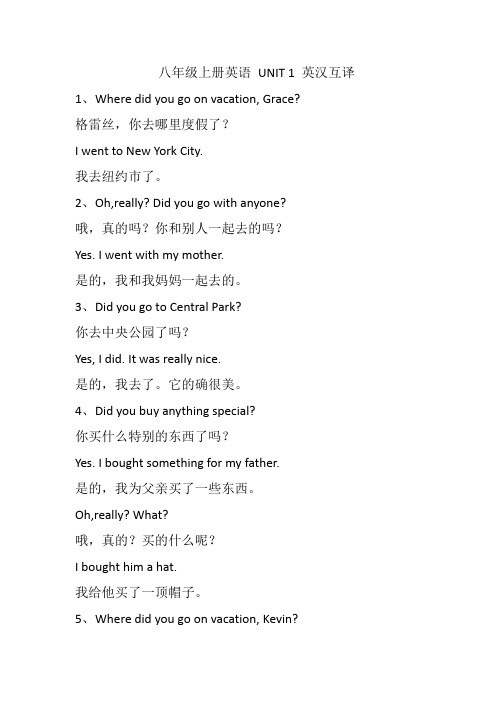
八年级上册英语UNIT 1 英汉互译1、Where did you go on vacation, Grace?格雷丝,你去哪里度假了?I went to New York City.我去纽约市了。
2、Oh,really? Did you go with anyone?哦,真的吗?你和别人一起去的吗?Yes. I went with my mother.是的,我和我妈妈一起去的。
3、Did you go to Central Park?你去中央公园了吗?Yes, I did. It was really nice.是的,我去了。
它的确很美。
4、Did you buy anything special?你买什么特别的东西了吗?Yes. I bought something for my father.是的,我为父亲买了一些东西。
Oh,really? What?哦,真的?买的什么呢?I bought him a hat.我给他买了一顶帽子。
5、Where did you go on vacation, Kevin?凯文,你去哪里度假了?|went to the beach.我去海滩了。
Oh, that's nice. Did you play volleyball?哦,那很好。
你打排球了吗?No, I didn't.不,我没打。
Well,did you swim?嗯,你游泳了吗?Yes, I did. The water was really warm.是的,我游泳了。
水很温暖。
6、How was the food?食物怎么样?Everything tasted really good!所有的东西尝起来真的很好吃!7、Did you meet anyone interesting?你遇到有趣的人了吗?Yes. I met some very interesting people.是的,我遇到了一些有趣的人。
(完整版)人教版八年级英语上册-Unit1-教案

Unit 1 Where did you go on vacation?教材解读本单元的核心话题是用一般过去时谈论度假等发生在过去的事情。
因此“Where did you go on vacation?”“Did you go to the beach? Yes,I did / No,I didn’t.”等是教学的重点。
通过对本单元的学习,学生能掌握本单元出现的地点名词,用于询问和回答过去发生的事情的短语和句型。
单元目标一、知识与技能1. 词汇:New York City, Central Park, exam, were, rainy, delicious,expensive, inexpensive, crowded, flew, kite, later, felt, little, corner, discuss, etc.2. 句型: Where did you go on vacation? I went to summer camp.Did she go to Central Park?Yes, she did.No, she didn’t.3. 语法:一般过去时的特殊疑问句、一般疑问句及肯、否定回答。
4. 能力目标:能用一般过去时熟练谈论假期发生的事。
二、过程与方法灵活运用教材,从所教学生的实际水平和语言能力出发,调整和取舍教学内容,合理安排本单元的课时数,设计好每课时的教学内容。
三、情感、态度与价值观1.通过描述假期发生的事,增进同学间的了解,增进感情。
2.通过图片和视频欣赏优美的风景,培养热爱祖国大好河山的思想感情,提高学生的环保意识。
3.了解自己的能力,培养情操4.培养学生们对英语的兴趣。
教法导航1. 以任务型教学作为课堂教学理念、利用整体语言教学法、情景教学法、交际教学法等。
2. 在教学中创设切实可行的任务型教学活动、突出交际性。
3. 教师为主导、学生为主体、任务为基础,注重实用性。
Unit1 晨读 人教版八年级英语上册
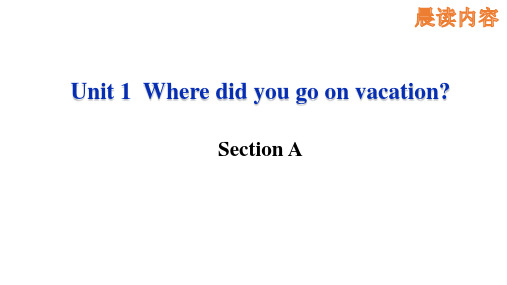
6. Did everyone have a good time? (P3) have a good time = have fun = enjoy oneself “玩得开心,过得愉快” have a good time doing sth. “做某事很高兴”
7. Still no one seemed to be bored. (P3) seem (+to be) +名词或形容词 “看起来……,好像……” seem to do sth. “好像/似乎做某事” It seems/ seemed that 从句 “看起来好像……,似乎……” It seems/ seemed as if…… “看起来像/仿佛……” bored “厌倦的,感到无聊的”,作表语,用于说明人的感受。 boring“无聊的,令人厌烦的”,作表语或定语,用于说明或修饰事物。
5. No, I bought nothing. (P3) nothing 不定代词,“没有什么,没有任何东西”= not anything There's nothing interesting in the newspaper.
= There isn't anything interesting in the newspaper.
4. We took quite a few photos there. (P2) take photos “拍照,照相” take photos/ a photo of sb/sth. “为某人/某物拍照” few “几乎没有”,修饰可数名词,表示否定含义。 a few “几个,有些” 修饰可数名词,表示肯定含义。 quite a few “相当多”
副词“足够地,充分地”,修饰形容词或副词,置于被修饰词之后。
八年级unit1知识点
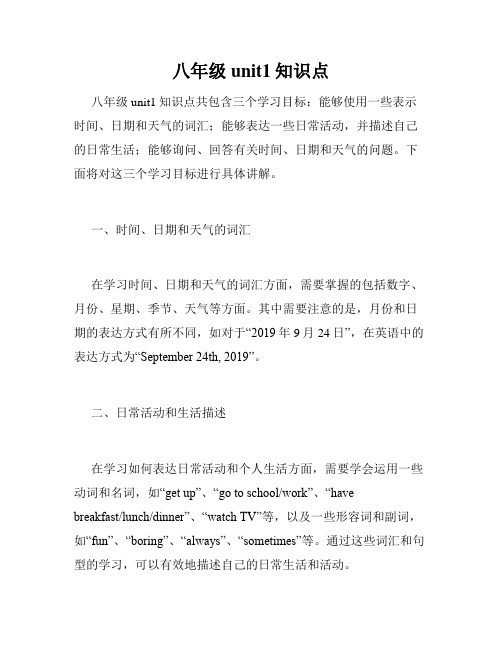
八年级unit1知识点八年级unit1知识点共包含三个学习目标:能够使用一些表示时间、日期和天气的词汇;能够表达一些日常活动,并描述自己的日常生活;能够询问、回答有关时间、日期和天气的问题。
下面将对这三个学习目标进行具体讲解。
一、时间、日期和天气的词汇在学习时间、日期和天气的词汇方面,需要掌握的包括数字、月份、星期、季节、天气等方面。
其中需要注意的是,月份和日期的表达方式有所不同,如对于“2019年9月24日”,在英语中的表达方式为“September 24th, 2019”。
二、日常活动和生活描述在学习如何表达日常活动和个人生活方面,需要学会运用一些动词和名词,如“get up”、“go to school/work”、“havebreakfast/lunch/dinner”、“watch TV”等,以及一些形容词和副词,如“fun”、“boring”、“always”、“sometimes”等。
通过这些词汇和句型的学习,可以有效地描述自己的日常生活和活动。
三、时间、日期和天气的交流在学习如何询问和回答有关时间、日期和天气的问题方面,需要通过一些句型和表达方式来掌握。
常用的交流方式包括:“What time is it now?”、“What’s the weather like today?”、“What’s the date today?”等。
而在回答方面,需要熟练掌握表示时间、日期和天气的词汇和表达方式,以便能够直接回答问题并进行进一步的交流。
总之,八年级unit1的知识点涵盖了时间、日期和天气的词汇、日常活动和生活描述以及时间、日期和天气的交流三个方面,需要通过不断的练习和实践来掌握和提高。
希望同学们能够认真学习和掌握这些知识点,以便更好地运用英语进行交流和表达。
- 1、下载文档前请自行甄别文档内容的完整性,平台不提供额外的编辑、内容补充、找答案等附加服务。
- 2、"仅部分预览"的文档,不可在线预览部分如存在完整性等问题,可反馈申请退款(可完整预览的文档不适用该条件!)。
- 3、如文档侵犯您的权益,请联系客服反馈,我们会尽快为您处理(人工客服工作时间:9:00-18:30)。
英语课堂教学效果检测
一.综合填空20分
Alice was sitting with her sister by the river and her sister was reading a book. Alice had nothing to do. Once or twice she looked into her sister’s book. “And what is a book for.” Thought Alice, “w_____ pictures or conversations?” Suddenly a white rabbit with pink eyes ran by.
There was n_____ strange about that. She heard the rabbit say, “Oh dear! Oh dear! I’ll be late!” and she did not think it was strange. Then the rabbit rook a watch out of its pocket and looked at it: A rabbit with a pocket and a watch? Alice got up and ran a____ the field after it. She saw it go down a large rabbit hole in the ground.
Then Alice went down a____ it, but never thought about h____ she was going to get out again. She found that she was f____ down a very, very deep hole. It was t____ dark for her to see anything. She was falling f____ a long time. W____ she was falling, she was thingking a_____ her cat, Dinah. Suddenly she landed on some dry leaves…
二.填空20分
Jo is fifteen and lives in Parkville. When Jo’s grandparents first came to Parkville, it was a _____ village. They had a small house, close to fields and hills.
Arnwick to find jobs, and they needed places to live. However, it was _______ to live in the city centre, _____ the government built flats outside the centre. Soon, Parkville became a city with over a million people. Jo’s family _______ in one of the those flats. It is very crowded, and rubbish ____ also a problem.
The small local school in Parkville closed ______ five years ago, so Jo now has to go to a school in Arnwick with 2000puples. It ______ an hour to get there by bus. There is a lot of traffic and pollution.
It is clear that Arnwick needs more schools, buses and hospitals. It needs fresh air, clean water and better public services. It also needs more police to _______ its people. But to do all these things, it needs more money.
However, can money help solve all these problems? Do we need more big cities like this? In fact, this is just a story. But it describes ______ is happening all over the world. Could it be your town some day?
三.单选20分
1._____ we got home, it began to rain.
You were lucky.
A.If
B. Before
C. As soon as
D. Because
2. I called you at 9:00 pm yesterday, but there was no answer.
Oh, I’m sorry. I ____ in a supermarket.
A.shop
B.shopped
C.am shopping
D.was shopping
3.Let’s have a cup of coffee _____.
Ok. I know a good place. Let’s go!
A.somewhere
B.anywhere
C. any where
D.some where
4. I ____ at the bus stop when I ____ my first teacher yesterday morning.
A.was sitting, met B.waited, was meeting
C.was waiting, was meeting
D.waited, met
5.The driver promised ____ the old man to the hospital at once.
A.send
B.sending
C.to send
D.sent
6.Shanghai is one of _____ most beautiful cities in ____ world.
A.a,the
B.the,不填
C. the, the
D. a, /
7.There is _____ water and ____ apples in the fridge.
A.too much, too much
B.too much, too many
C.too many, too many
D.too many, too much
8.This book can help me learn more about the world, ____ I like it very much.
A.so
B.but
C.till
D.or
9. what are you going to do during the National Day holiday?
_______. I will just stay at home.
A.Nothing special
B. Something special
C.Special nothing
D.Special something
10. I know the boy _____ Peter. He is very friendly to everyone.
A.call
B.called
C.calling
D.to call
四.完成句子10分
1.每周四下午我家有一个茶会。
There is a _____ ______ at my house every Thursday afternoon. Welcome to my home.
2.注意!公交车就要过来了。
_____ ______! The bus is coming.
3.今天上午我们及时到达了机场。
We arrived at the airport _______ ________ this morning.
4.稍等一会!我很快就来。
_______ _______ a minute, I am coming.
5.女老师占我们学校人数的四分之三。
_____ ______ of the teachers in our school are women teachers.
五.连词成句10分
1. tree it in a and smiling was at sitting everyone.
2. listening a the bike riding his and was to music on boy road.
3. a country many population is big problem in increase.
4. grow won’t so China’s population fast.
5. a makes that over 131.4 births year million.
六.英汉互译20分
1.偶尔
2.考虑
3.及时
4.从…跌落
5.并肩
6.稍等
7.关闭8.中国的人口是多少?
9.注意10.五分之二。
